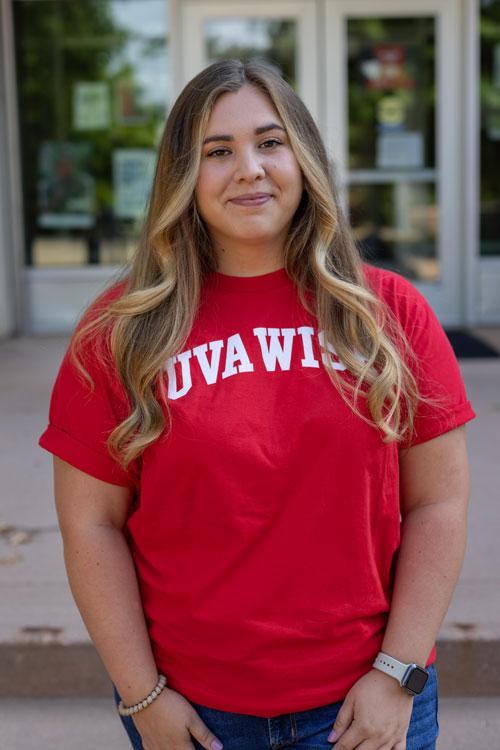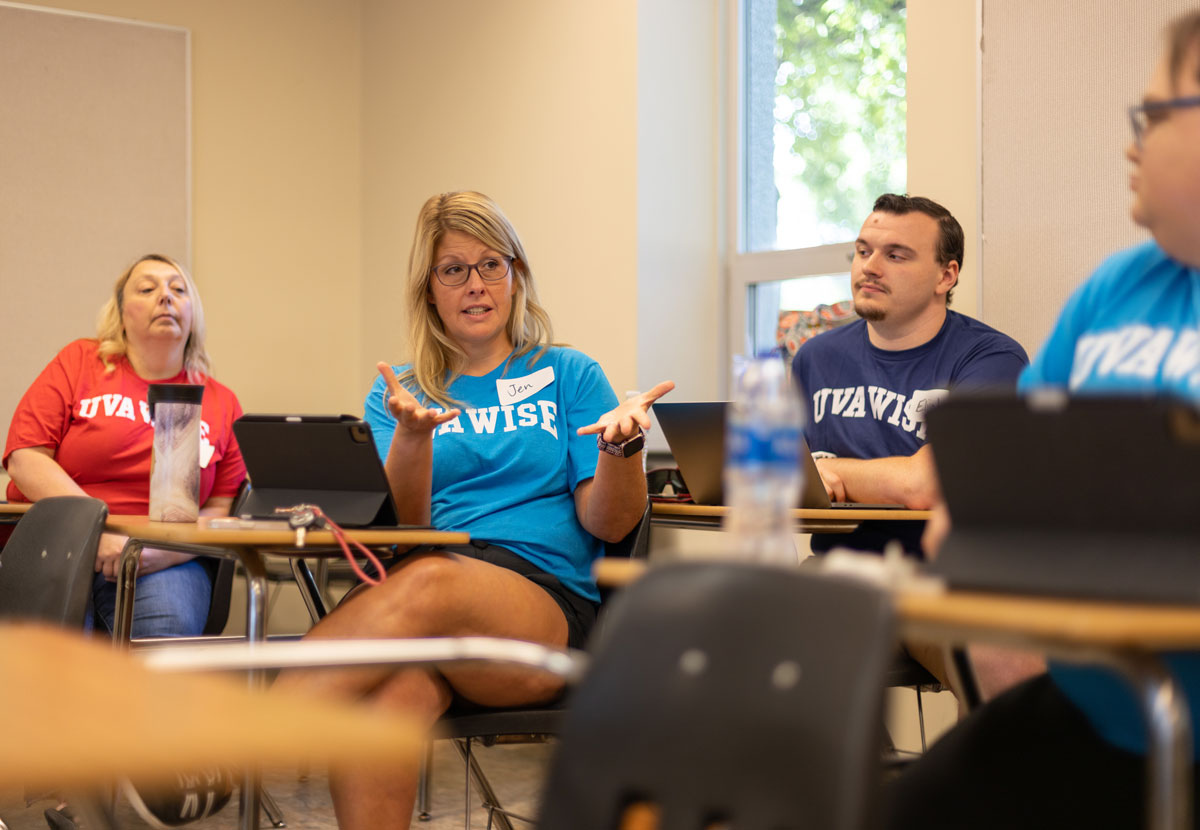UVA Wise and UVA collaborate to train Southwest Virginia K-6 teachers in virtual science instruction

When UVA Wise alumna Emily Gibson ’19 graduated, she didn’t expect to teach science or instruct students virtually.
“In college my concentration was math. So, I expected to go out into the world and teach math. In my second year, they asked me to teach math and science. I wasn't as confident in the sciences so I reached out to UVA Wise instructor Adriana Undreiu for help,” said Gibson who now teaches fifth grade math and science at Nickelsville Elementary School in Scott County.
COVID-19 cut Gibson’s first year of teaching short. Most teachers weren’t ready to teach virtually because the focus had been on classroom preparedness. Like Gibson, most teachers before COVID were mainly trained for in-person science instruction, not in virtual instruction.
Last week, Gibson, along with six other K-6 science teachers, gathered at UVA Wise for a weeklong professional development session on science and virtual instruction.
“I found the virtual aspects to be the most helpful because we do have these snow days that are virtual now. Because of COVID, kids don't get traditional snow days anymore. We are expected to teach on those days,” Gibson said.
Also because of COVID, UVA Wise Associate Professor of Biology Josephine Rodriguez and Associate Professor of Education Andy Cox worried about a reduction in science instruction.
“We saw that science instruction was just not happening in pre-K through sixth grade. And the reason it wasn't happening, we thought, was just because teachers don't have a lot of training in virtual instruction,” Cox said.
This wasn’t the first time Cox worried about science instruction. A few years prior, Cox submitted a grant proposal to the National Science Foundation to focus on teacher training. The project was not funded but the feedback he received was instrumental in writing another grant. When UVA and UVA Wise created the 3Cavaliers grant program to provide seed funding for research by faculty from different disciplines, they saw an opportunity. Since the 3Cavaliers program connects faculty from multiple disciplines, they both thought this was a perfect time to submit a grant to support virtual teacher training.

To round out the three, Rodriguez and Cox teamed up with UVA Associate Professor of Science Education Frackson Mumba and his Ph.D. student John Ojeogwu to study how to improve virtual science teaching. In addition to faculty, they also had wonderful support from UVA Wise administrative assistant Tammie Hale who helped coordinate the project.
The group was awarded $60,000 in 3Cavaliers grant funding to conduct research and support the immersive educational professional development for K-6 science teachers in Southwest Virginia.
To start their research, the team surveyed regional K-6 teachers who teach science.
“We were establishing a baseline as to their comfort and content in teaching science and the connection to teaching science virtually,” Cox said.
Eight school systems participated in two surveys, expected to be the basis to a bigger research project through NSF. The self-efficacy pre-survey had 82 teacher responses. The content knowledge pre-test had 65 responses. UVA Wise then asked those teachers if they would be interested in participating in the summer professional development program.
Last week, teachers from Lee, Dickenson, Russell, Scott, Wise, and Washington counties attended the professional development workshop on UVA Wise’s campus.
“Our teachers are our superheroes. On this project, we are operating from a place of profound gratitude and respect for teachers and we want to support them and the extraordinary work they do. The 3Cavaliers grant was an investment in our teachers, which is effectively an investment in our kids and futures,” Rodriguez said.
Cox said it is difficult to ask teachers to do virtual instruction without having the appropriate technological tools. The grant included iPads for the teachers along with any other payment for virtual classroom-related costs and stipends for the teachers.
Lauren Worley, a first grade teacher at Valley Institute Elementary School in Washington County, teaches a broad range of topics including science. Worley says she loved all the resources she’s received and has already reached out to other teachers to share them.
“I think the biggest thing I’ve taken away from this week is that the community at UVA Wise is willing to come in and help. Even though I didn’t graduate from here, I feel like the community is very supportive and every professor this week has offered to come to our classrooms to demonstrate or help. You don’t find that everywhere,” Worley said.
For the week, science courses were taught by UVA Wise natural science faculty including Rodriguez, Associate Professor of Physical Chemistry Galen Sedo, Van W. Daniel III Associate Professor of Chemistry Tegan Makal, and Associate Professor of Biology and Natural Sciences Department Chair Robin Woodard.
“Science is pretty hands-on, and it's hard to do virtually,” Gibson said. “They showed us things like simulations and virtual field trips that kids can explore from home. Some kids from this area don't get the opportunities to go to places like Virginia Beach and see marine museums and things like that.”
Cox recruited experts in virtual pedagogy Steven Sproles and Candi Conner from Virtual Virginia, a program of the Virginia Department of Education offering online Advanced Placement, world language, core academic, and elective courses.
One of Gibson’s favorite lessons was virtually exploring a coral reef.
“Almost every grade has some sort of habitat standard or systems and processes about nature to teach. I’ve never been diving on a coral reef. There are things out there for students to learn more immersively and I think we shouldn't discount the virtual teaching aspects even when we're in the classrooms,” Gibson said.
Rhonda Arrington, who teaches fourth grade for Lebanon Elementary School in Russell County, enjoyed Rodriguez’s talk on biology and insects because she often discusses those subjects with her students.
“It’s been excellent collaborating, and I have enjoyed all the new techniques,” Arrington said. “I liked the resources I could take back to share with my students.”
John Ojeogwu of UVA is conducting surveys and one-on-one interviews with the teachers who participated in the professional development sessions.
“I will ask them about their experience and find out what they think we should improve going forward,” said Ojeogwu, who enters his third year in a PhD program at UVA this fall. “It was a great opportunity to make an impact on science education. The hope is to improve it, reach more teachers and even go beyond this region.”
Rodriguez said she hopes they discover gains at the intersection of content knowledge, the subject matter, and what they know about teaching.
UVA Wise professors also plan on using these results as a basis for further study, development, and teacher education. The outcomes of the professional development will be used to develop a new NSF grant proposal to prepare master teachers in virtual science instruction. The participant teachers will serve as mentors to new teachers in the grant. This is a continuation of our investment in teacher professional development in the region.
“We are hoping that these teachers will go back to their home schools and share what they learned this week with their peers. We know that science instruction and student learning can continue in a virtual environment,” Cox said.